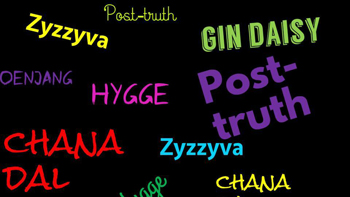Jun 28: Eating a tasty meal with chana dal or doenjang washed down with a gin daisy could well foster a nice feeling of hygge. Just hope you don’t find any zyzzyva on your plate.
If you need to look up any of those words, the unofficial custodian of the English language now has the answers.
In its latest update, the Oxford English Dictionary identified more than 600 words, phrases and senses that have entered common parlance. They include “zyzzyva”, a genus of tropical weevils native to South America. The word replaces zythum – an ancient Egyptian malt beer – as the OED’s final entry.
The name was apparently coined by the US entomologist Thomas Lincoln Casey, who described it in a 1922 work, the OED said. “In any case, zyzzyva owes much of its currency in English to its notoriety as the last entry in various dictionaries, the ranks of which now include the OED,” it said.
The quarterly update includes “post-truth”, previously announced by the OED as its word of the year for 2016 following Britain’s Brexit referendum and Donald Trump’s presidential victory.
“Brexit” itself also made into the dictionary last year, meeting the OED’s criterion that a new word, phrase or sense of a word must have featured in a variety of printed sources over several years.
Other new senses this time include “thing”, as in “a genuine or established phenomenon or practice”, often used when you’re incredulous about something. The OED said the earliest citation of this new sense was from a 2000 episode of the US TV drama The West Wing: “Did you know that ‘leaf peeping’ was a thing?’”
Just in time for this year’s Wimbledon tournament are 50 new terms relating to tennis, such as “forced error”, “chip and charge” and “career slam”.
Further additions to the English lexicon are chana dal, the Hindi phrase for chickpeas, and doenjang, a paste made from fermented soya beans used in Korean cookery. A gin daisy is a cocktail made with gin, lemon juice and (usually) grenadine.
Drink enough gin daisies and you may well be overcome by hygge, the Danish term for “a quality of coziness and comfortable conviviality that engenders a feeling of contentment or well-being”.





Comments
Add new comment